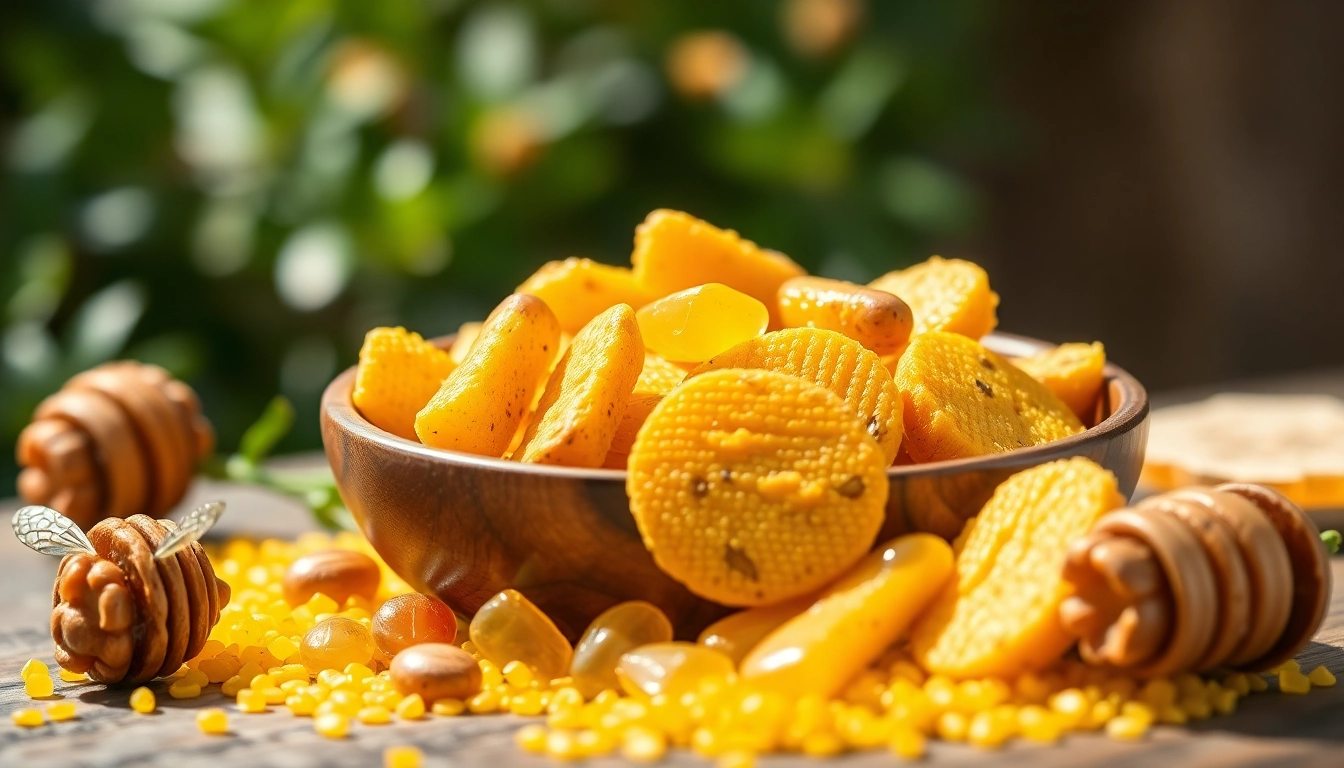
Understanding Bee Bread Supplements
Bee bread supplements have recently surged in popularity due to their rich nutritional profile and myriad health benefits. Derived from a unique blend of pollen and honey, fermented by bees, these supplements are often touted as a superfood. As more individuals become health-conscious, products like bee bread supplements are becoming a staple in health regimens. In this article, we will delve into the essential characteristics of bee bread, its nutritional components, and how fermentation enhances its quality.
What is Bee Bread?
Bee bread, also known as perga, is a substance made from pollen mixed with honey and bee salivary enzymes. It serves as a primary source of protein and energy for bee colonies. When bees gather pollen from various flowering plants, they pack it into honeycomb cells and add honey and enzymes. The resulting mixture undergoes fermentation over time, resulting in a nutrient-dense superfood rich in bioactive substances.
This ancient food source has been utilized for its health benefits for centuries, heralded by various cultures as a highly nutritious supplement. It contains a balanced mix of macronutrients, minerals, vitamins, and enzymes, making it a potent dietary enhancement.
Nutritional Composition of Bee Bread
The nutritional composition of bee bread is impressive and multifaceted. It is primarily composed of the following:
- Proteins: Bee bread is rich in easily digestible proteins that support muscle growth and repair.
- Amino Acids: It contains all essential amino acids, crucial for various bodily functions, including hormone production and immune response.
- Vitamins: Particularly B vitamins (such as B1, B2, B6, B12), vitamin C, and vitamin E, which play a critical role in energy metabolism and antioxidant protection.
- Minerals: Rich in essential minerals such as magnesium, iron, calcium, zinc, and phosphorus, which are necessary for optimal body functioning.
- Carbohydrates: These are primarily found in the form of sugars, providing a natural energy source.
- Antioxidants: Bee bread is high in flavonoids and phenolic compounds that combat oxidative stress.
The Role of Fermentation in Supplement Quality
Fermentation is a crucial process that not only preserves bee bread but significantly enhances its health benefits. During fermentation, beneficial bacteria and enzymes break down the nutrients into more bioavailable forms, making it easier for the body to absorb them. This process also helps to increase the levels of essential nutrients, such as B vitamins and probiotics, which are beneficial for gut health.
Moreover, fermentation can improve the overall taste and texture of bee bread. The fermentation process acts as a natural preservative, extending shelf life without the need for artificial additives. As a result, supplements made from high-quality fermented bee bread are often regarded as superior products.
Health Benefits of Bee Bread Supplements
Incorporating bee bread supplements into your diet can offer an array of health benefits. From strengthening the immune system to enhancing cognitive function, this superfood is a powerhouse of vitality. Below are some of the notable health benefits associated with regular consumption of bee bread.
Boosting Immune Function with Bee Bread
Bee bread is known for its bolstering effects on the immune system. Its blend of vitamins, minerals, and antioxidants protects the body against infections and diseases. Essential nutrients like vitamin C, zinc, and polyphenols work synergistically to enhance immune response and reduce inflammation.
Several studies have indicated that bee bread can stimulate the production of antibodies, aiding in the fight against pathogens. Furthermore, the probiotics present in fermented bee bread support gut health, a key factor in overall immunity. A healthy gut microbiome plays a critical role in producing immune cells and regulating immune responses.
Energy and Endurance Enhancements
Many athletes and fitness enthusiasts turn to bee bread supplements to enhance energy levels and endurance. The natural sugars in bee bread provide a quick energy boost, making it an excellent pre-workout snack. Additionally, the extensive amino acid profile helps in muscle recovery and reduces fatigue.
Moreover, the B vitamins found in bee bread are essential in energy metabolism. They help convert food into usable energy, making it easier to maintain high levels of activity throughout the day. Users often report improved performance and reduced recovery times when integrating bee bread into their routines.
Cognitive Benefits Tied to Bee Bread Consumption
Cognitive health is another area where bee bread shines. Studies have suggested that the antioxidants and essential fatty acids present in bee bread may support brain health by improving memory and enhancing focus. Vitamin E, in particular, has been linked to cognitive function, as it protects brain cells from oxidative damage.
Additionally, bee bread’s probiotic content may contribute to better mental health by promoting a balanced gut microbiome, which has been correlated with mood regulation and cognitive performance. Integrating bee bread into daily nutrition may help improve overall mental clarity and cognitive function.
How to Incorporate Bee Bread Supplements into Your Diet
Integrating bee bread supplements into your diet is straightforward and can be tailored to your preferences. Here are several practical ways to enjoy the benefits of bee bread while enhancing your daily nutrition.
Recommended Dosages for Optimal Results
While individual needs may vary, a general recommendation for bee bread supplementation ranges from 1 to 2 tablespoons daily for adults. It is advisable to start with smaller doses, especially if you are new to the supplement, and gradually increase as necessary. For children, it’s best to consult with a healthcare provider for appropriate dosages.
Recipes Featuring Bee Bread Supplements
Incorporating bee bread into recipes can be a delicious way to enjoy its benefits. Consider the following ideas:
- Smoothies: Blend a tablespoon of bee bread into your morning smoothie for added nutrients.
- Oatmeal: Stir bee bread into hot oatmeal for a nutritious breakfast boost.
- Baked Goods: Replace a portion of flour in muffins or bread with bee bread for a nutritious twist.
- Energy Bars: Create homemade energy bars by mixing bee bread with oats, nuts, and natural sweeteners.
Pairing Bee Bread with Other Nutrients
To maximize the health benefits of bee bread, consider pairing it with other nutrient-rich foods. For example, combining bee bread with sources of good fats, like avocados or nuts, can enhance its absorption of fat-soluble vitamins. Similarly, pairing it with citrus fruits can increase your vitamin C intake, promoting iron absorption from meals that include bee bread.
Choosing Quality Bee Bread Supplements
As the market for bee bread supplements grows, knowing how to select high-quality products is crucial for reaping the maximum benefits. Here are some tips to ensure you choose the best bee bread supplements available.
Identifying Reliable Brands and Products
Research is key when it comes to selecting bee bread supplements. Look for reputable brands that provide third-party testing results to ensure product integrity and quality. Customer reviews can also provide insight into the effectiveness and sourcing of the bee bread.
Understanding Labels and Certifications
When shopping for bee bread supplements, pay close attention to labels. Look for certifications, such as organic, non-GMO, or raw, which indicate higher product quality. Additionally, verify the ingredients list for any fillers or additives that might detract from the health benefits.
Common Adulterants to Avoid
Unfortunately, some products may contain adulterants, which can undermine the health benefits of bee bread supplements. Common additives to avoid include:
- Sugars: Excessive added sugars can negate the health benefits.
- Fillers: Ingredients that dilute the potency of the product can reduce effectiveness.
- Artificial preservatives: Look for additives that can cause adverse reactions in sensitive individuals.
Potential Side Effects and Considerations
While bee bread supplements offer numerous health benefits, it is essential to understand potential side effects and considerations before incorporating them into your diet.
Who Should Use Caution with Bee Bread?
Individuals with pollen allergies or sensitivities should proceed with caution when considering bee bread supplements. As these products contain pollen, they may trigger adverse reactions in susceptible individuals. It is crucial to consult a healthcare provider before starting supplementation if you have allergies.
Addressing Allergies and Sensitivities
If you experience any allergic reactions after consuming bee bread, such as skin irritations, respiratory issues, or gastrointestinal symptoms, discontinue use immediately and seek medical advice. It’s also prudent to start with small quantities to monitor for any adverse effects.
When to Consult a Healthcare Professional
Before adding bee bread supplements to your routine, consult a healthcare professional, particularly if you are pregnant, breastfeeding, or taking medications. Professional guidance ensures you can safely enjoy the benefits of bee bread without risking interactions or adverse effects.





